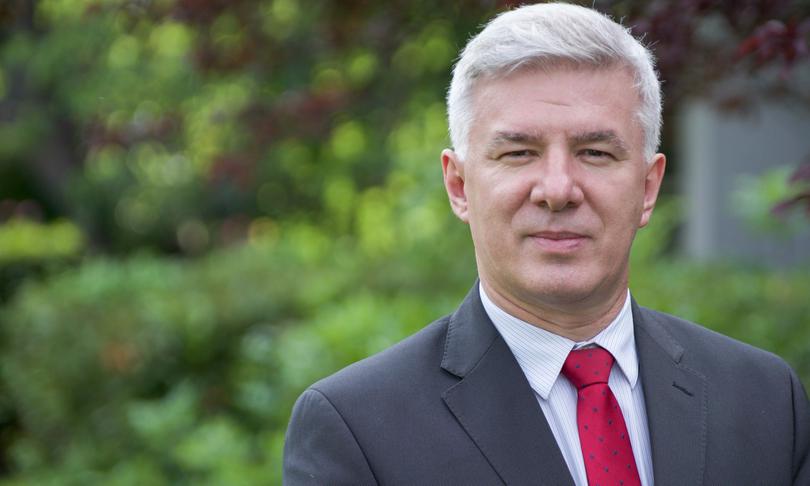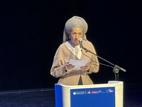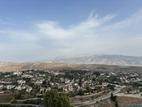Editor’s note: China Christian Daily recently conducted an interview with Rudelmar Bueno de Faria, the general secretary of the ACT Alliance, a global alliance of the World Council of Churches and Lutheran World Federation member churches and related organizations committed to working ecumenically in humanitarian relief, development and advocacy. Amid social issues like gender injustice, climate crisis, and the post-truth era, Rudelmar urged Christians to take action to change the world and society. This is part 2 of the interview. Read part 1 of the interview here.
China Christian Daily: There is a very large social issue happening in China. The Xuzhou chained mother of eight incident was about a woman who was trafficked from her hometown in Yunnan and chained to a hut in the winter for decades. Millions of Chinese netizens cry out to promote the rights of women and gender equality. Can you comment on this?
Rudelmar Bueno de Faria: Yeah, I haven't heard from the media about the issue of the chained mother of eight as it is called by the media. I think that was at the beginning of this year. But I do not have detailed information about how the case has progressed in terms of holding those involved in this crime, I would say, accountable for their action.
It is a big issue and concern for us as the ACT Alliance. We have a global program on gender justice, working with all our members, the national council of churches in many regions, and the regional economic organizations.
The issues of human trafficking, sexual abuse, and gender-based violence are unacceptable. We as Christians cannot accept this kind of action. We have to act as Christians as well to help to change the systems that perpetuate this kind of treatment against the people of God, or human beings.
I'm very happy that there was this big outcry in China because, in many countries, including within Europe, we have situations that sometimes are not even exposed. We have many trafficked people from all regions, from Africa, Latin America, and Asia, coming to work as forced workers. They are very sophisticated systems, and sometimes it's very difficult to find them, and also difficult for them to get out of this situation.
So I think that as Christians, we need to do something. We need to speak out and to support all those victims of human trafficking and gender-based violence because that is not acceptable in the eyes of God.
China Christian Daily: Regarding the climate crisis, which regions are facing the most serious environmental problems and what kind of problems are they?
Rudelmar Bueno de Faria: Climate change is one of the biggest challenges we face as humanity. Sometimes that is overshadowed by other problems like the Ukraine war we are seeing now, and that causes people not to commit themselves to reducing the emission of CO2. We have a big development in the COPs (the Conference of the Parties) on the climate agreement that is evolving. I want to congratulate China’s government for this because China has been one of the big nations that have been exemplary in terms of the commitment to reducing CO2, and also to keep the temperature rise to around 1.5 degrees.
But there are many issues related to that. Of course, we need to have this commitment, but we have too many commitments and in some situations, not many actions have been taken in terms of changing patterns of producing the use of fossil fuels, so I think there is a lot to do on that part. But the big impact of climate change will be on the people, especially those who are considered to be the most vulnerable. Those that are living on small islands in the Pacific, in Asia, have hardly contributed at all to climate change, but are losing their lands, their infrastructure is damaged because of the increased frequency of the strongest climate events that are affecting their lives.
We have also climate-induced migration, which is something that has a big impact on the life of everyone. So I think mitigation and adaptation are not the only things we can do as communities, as government, and as humanity. We also need to talk about climate justice, about how those countries that have been using industrialization and also the pollution of the country to help those poor countries that are not able to take such measures, that is the most affected. This is what we call the equalization of climate change. Lost and damaged, that is one of the areas we are pushing in the equalization as ACT Alliance to be on the agenda of the agreements between governments.
China Christian Daily: Uncommon things happen in China, we experience floods, rainstorms in the north part of China. Normally we have more rain in Southern China, but last year, almost winter, there are big rains in northern China. It’s very uncommon.
Rudelmar Bueno de Faria: In my own country Brazil, we never had so many floods as we have now with big numbers of people who have lost their lives. That kind of flood had never happened before. If you see in the US or Australia, big fires are happening there, and that’s because of climate change as well. One element is the intensity of the natural disasters, typhoons, hurricanes, which have become much more aggressive in terms of reaching scales that are much higher than before.
We have noticed that the rising sea levels are already affecting small islands in Bangladesh for instance in Asia. In Latin America as well, I think it is because of this that the World Council of Churches (WCC) is more present in Latin America where people are advocating more about these kinds of things. But all of us will suffer, especially people from the global south. Because the countries in the global south will be the most affected by the rising sea level, and also because of poverty associated with that. Many of these countries do not have the means to establish a mechanism to mitigate the effects of climate change.
Every nation is facing this, and some of them are trying to deny it because of their political and economic interests. But people know that- especially people working on the land, culturists, farmers- they know how this is affecting, the level of rain, drought, in some situations are too much and will affect food security globally as well. Production of vegetables and any other greens will be very complicated, and it will never be the same.
China Christian Daily: For dealing with all these cases, what church can do to respond? Recently we have had a wildfire in South Korea and floods in Australia.
Rudelmar Bueno de Faria: I think the Church can engage in different ways.
One is in advocacy. Because religious leaders have a strong influence in their communities and society. They have a moral voice that brings, especially in the climate change issue, the association with the creation of God. The earth was created by God, and not human beings, so we need to live in harmony with the environment. This message needs to come. Because in the secular world, it is very easy to disassociate things in terms of the dimension of God’s creation with the technical events that they see happening. So religious leaders can bring this dimension. Even the equalization on the COP level, we need to have these kinds of things.
Second, religious communities and Christians, have historically been providing support to communities that are affected by disasters. So we can support our communities, and mitigate the effect of climate change. That is more practical support to create resilience for the topic that exists.
The third one would be for churches themselves to stop investing in non-renewable energies. We have many churches that have a large amount of money invested in this. I think they should support renewable energy because this is one way that you can help to save the planet.
China Christian Daily: Eco-theology mentions some good practices of churches and how they started to invest in climate change for example how they already started to use green energy, clean energy. Can you tell us some examples of good practices?
Rudelmar Bueno de Faria: I will start with the examples of WCC, the ecumenical center based in Geneva. This is the property of WCC and was built back in 1951. We are rebuilding the entire plot with green buildings. That is one example of something where everything is sustainable in terms of energy and consumption of CO2. Another example of a global organization like WCC, ACT Alliance, is doing this in part also.
But as for the churches, the divestment of fossil fuels is something that they can do as well. We are seeing results already that the big oil producers are changing to renewable energy. Within our lives as well, I think the church needs to call Christians to be aware that even what we will do at home makes an impact. There are millions of Christians like us in the world today. You can imagine the impact if we all do the same thing together. It would be wonderful.
China Christian Daily: What’s your suggestion for every Christian, and what can they do in their daily life to help?
Rudelmar Bueno de Faria: I will do what I can do as a Christian. I came from south Brazil where the consumption of meat is very big. There are producers of cows, and they sell them around the world. I grew up in the culture of eating meat every day, even twice a day, both in lunch and dinner. I have stopped doing this because it is a big producer of CO2.
Second, I think all we can do at home is consider our appliances that are consuming a lot of energy. Like using less lamps- in some countries that is normal, but in the majority, it is not. There is the issue of how people have access to that, and stop using our cars and start using public transportation which are using renewable energies. Like in Geneva, for example, we do not need to use a car. Our transit is electric, and that is the attitude.
We are consuming many things that are not good for our health. We need to change our lifestyle by focusing on eating more green products. Also, we should consume what is produced in our communities, rather than importing it from everywhere because that results in a much bigger carbon footprint.
China Christian Daily: Within the Christian world, how can we unite more organizations, more people, and more power to do something bigger, to deal with this problem?
Rudelmar Bueno de Faria: Within the Christian network, we have many coalitions working on climate justice. We also connect with environmental organizations. One of the things we can do more is to do this in a multi-faith space. Because of the power of religion in many countries, we need to work together. Christians with Buddhist, with Muslims, wherever you are because it’s an existential issue. If we do not act together, we will not have our planet. We will not have our lives in the future. We will have much more conflict, hunger, and a lack of water, which are already big problems because of climate change. So we need to think in terms of the existence of humanity, and also our role to protect what God has given us to protect, we are not doing that properly.
China Christian Daily: Now we are in a time of social media, our time is like a post-truth area. One question is becoming more and more important: how can Christians and the church engage in the discussion of many important social public issues?
Rudelmar Bueno de Faria: That’s a big problem. Polarization in society today, in our families, between our friends, even in our societies, between governments, is created because of the misuse of social media. This is creating a lot of divisions and fake news. It also creates this space for people to invent new truth, which is what is known as the post-truth society. They are dismantling values and history and facts.
That’s the big role the church needs to fulfil. When you change history that does not exist, when you change or you use politics, as we have seen in the case of the war in Ukraine as well, there is a lot of misinformation from both sides which makes people confused, they do not know what to believe. That affects values as well. If you have a new reality, you start to change values. And Christian values are also at stake. Values of inclusion, solidarity, justice, are being completely taken away from us. Religious leaders and churches have an essential role to correct the facts, to look how science also is important, the effect that is happening, to not believe everything people are saying. Trying to look for different sources, to determine if there is a discrepancy in order to inform them the best way to follow.
We have the case of the vaccinations against COVID-19, many religious organizations are being bold in saying no and standing up against vaccination. They have caused the hesitancy within people with respect to taking the vaccines. That’s why a lot of people died. In my own country in Brazil, it’s not the churches doing this, but the government. They started to deny the efficacy of vaccines, saying that they are not important and that everyone should be infected. Given that we have a population of 220 million people, it is estimated that about 650 people died because of this misinformation.
In the age of social media, fake news, post-truth, and polarized society, the church needs to have a prophetic voice, a voice influenced by science and real facts. We cannot just create an imaginary virtual world, which is often what happens. Some people live in this virtual world, believing it exists, and in some cases even saying that the earth is completely flat. We have a movement, especially in the US that is contaminated and spreading throughout the world, they are creating conspiracy theories which many people have been led believe are true. Some religious leaders, and churches play an influential role in that.
ACT Alliance had its general assembly back in December 2021, we had a number of member conversations, and one of the topics that we discussed was the issue of fundamentalism and democracy, and in this context, the issue of fake news and how it is used came up. We have the confluence of religious, economic, and political fundamentalists sometimes that use this fake news as a way to gain faith and membership, to get votes, to be elected, and so on. That’s the case of Brazil, the US, we know how that happens.












